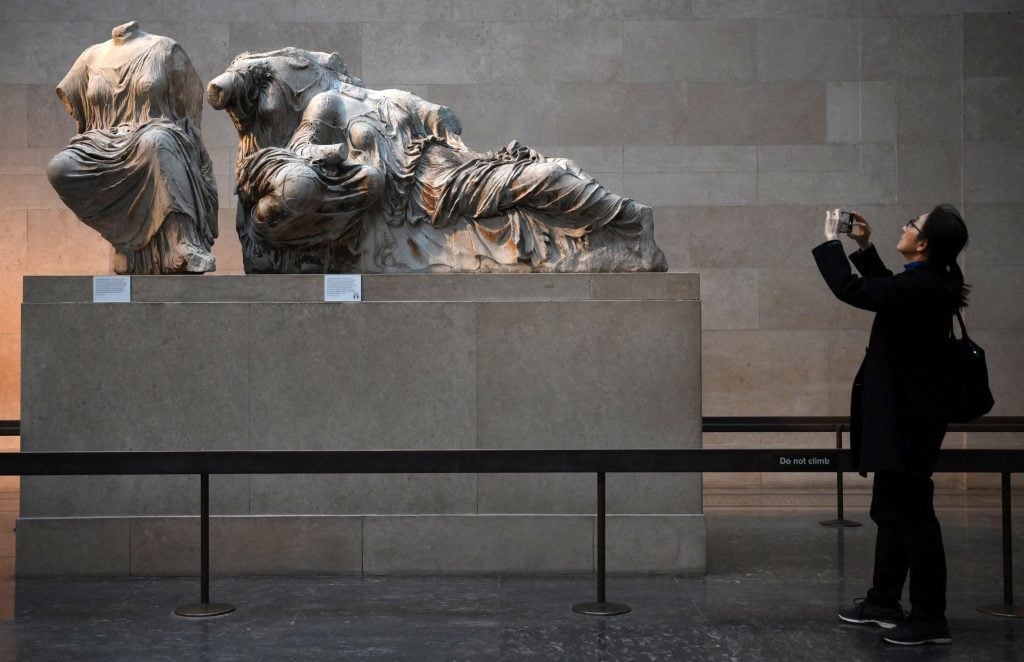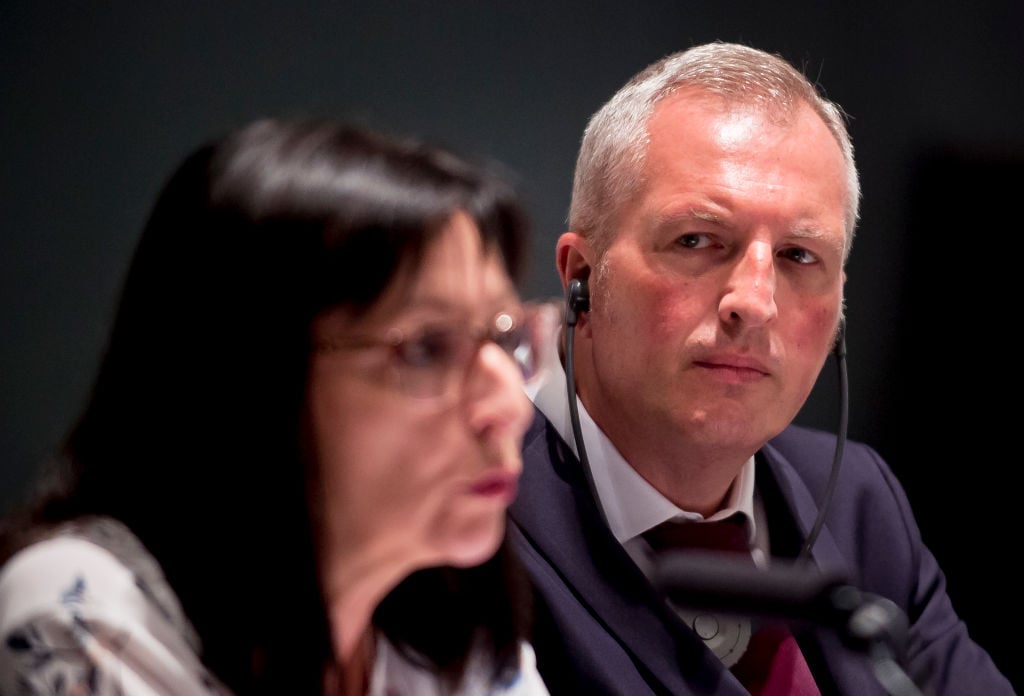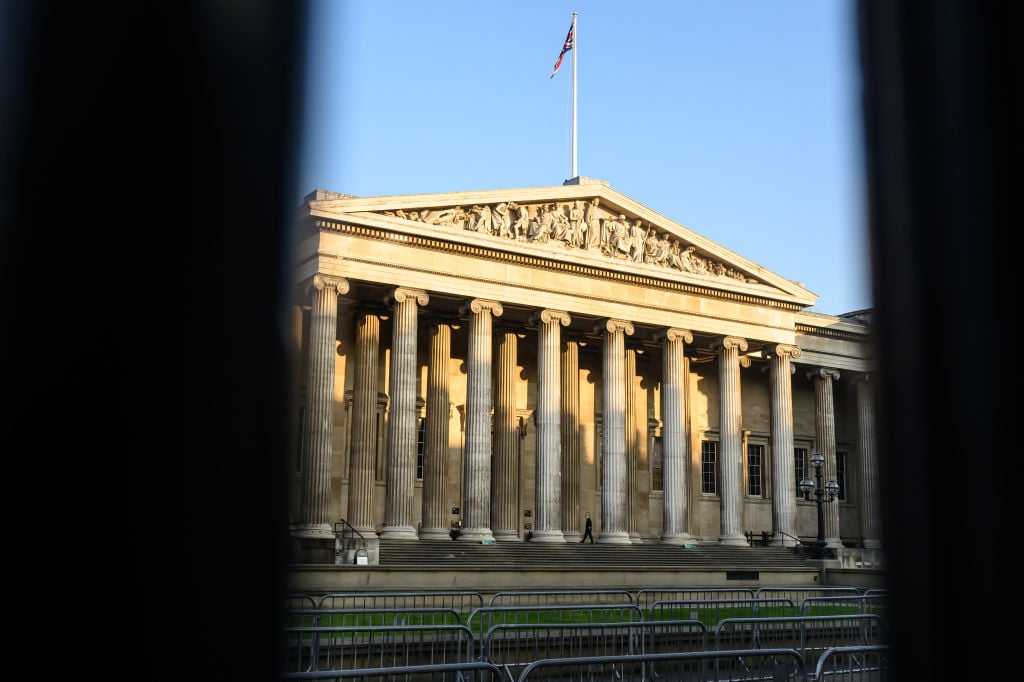While details surrounding a spate of thefts at the British Museum continue to emerge, Greek officials are using the scandal to politick for the return of the Parthenon Marbles.
The security questions raised by the missing objects “reinforces the permanent and just demand of our country for the definitive return” of the Marbles, Greece’s Minister of Culture, Lina Mendoni, said in a recent interview with the newspaper To Vima.
The museum, which has owned the Marbles since they were removed from the Acropolis of Athens in the early 19th century by British nobleman Lord Elgin, has repeatedly denied Greece’s requests for the relics to be repatriated. But the Greeks’ campaign has gained momentum in recent years amid international calls for cultural institutions to decolonize their holdings.
“The loss, theft, deterioration of objects from a museum’s collections is an extremely serious and particularly sad event,” Mendoni went on. “In fact, when this happens from within, beyond any moral and criminal responsibility, a major question arises regarding the credibility of the museum organization itself.”
She further explained that the “Ministry of Culture is following the development of the issue with great attention.”

Visitors view the Parthenon Marbles, also known as the Elgin Marbles, at the British Museum in London on January 9, 2023. Photo: Daniel Leal/AFP via Getty Images.
Last Wednesday, August 16, the British Museum announced that it had dismissed an employee after discovering valuable items in its collection—including pieces of gold jewelry and gems of semi-precious stones and glass dating from the 15th century B.C.E. to the 19th century C.E.—were missing. The institution said it planned to take “legal action” against the then-unidentified staffer, and that the Economic Crime Command of the Metropolitan Police was investigating the situation.
Days later, the news reports revealed that Peter John Higgs, a senior curator of Greek and Roman art who had worked at the museum for 30 years, was the fired employee. Higgs is suspected of having stolen the objects over a period of years.
Many were listed for sale on eBay, often for prices that reflected just a fraction of their actual value. One piece of Roman jewelry made from onyx, estimated by a dealer to be worth between £25,000 and £50,000 ($31,850 and $63,700), was offered for just £40 ($50) in 2016, according to the Telegraph.

Curator Peter John Higgs [R] during a press conference for “Agon! La Competicion En La Antigua Grecia” at Caixaforum Madrid on July 13, 2017 in Madrid, Spain. Photo: Samuel de Roman/Getty Images.
Notably, the news of the missing objects comes just weeks after the museum’s director of eight years, Hartwig Fischer, said that he will step down from his role next year. Staffers at the institution have speculated that the surprise announcement was related to the thefts. Others have called for Fischer to resign immediately.
“Hartwig has been a much-respected director,” George Osborne, chair of the British Museum, told the BBC. “I have been very clear—as has Hartwig—that his decision was not connected to our announcement last week.”

Hartwig Fischer. Photo by Sean Gallup/Getty Images.
The BBC reported that, in February 2021, an art dealer named Ittai Gradel alerted the British Museum that he had seen items from its collection for sale online. The institution’s deputy director, Jonathan Williams, responded to the dealer five months later saying, “there was no suggestion of any wrongdoing.”
Unconvinced, Gradel continued to follow up on the situation. In an email to a British Museum board member, he accused Williams and Fischer of “sweeping it all under the carpet.” In an October 2022 message sent to the same board member, Fischer claimed there was “no evidence” of any wrongdoing, and that the items mentioned by Gradel were “in the collection.”
Osborne later said in an email to an unnamed museum trustee that “there is no evidence to substantiate the allegations.” In January of this year, Osborne told Gradel that “I have taken your comments very seriously.”
More Trending Stories:
An 1837 Portrait of an Enslaved Child, Obscured by Overpainting for a Century, Has Been Restored and Acquired by the Met
Rising Artist Ronan Day-Lewis’s ‘Punk Romanticism’ Imbues Desolate American Landscapes With an Eerie, Cinematic Aura
Why Did Yoko Ono’s Arboretum Art Installation in New York Shut Down Early? ‘Unfortunately, Trees Died’
LGDR Gallery Splits Up After Less than Two Years as Founding Partner Jeanne Greenberg Rohatyn Departs
Photographers Recreate Old Master Paintings in Witty and Profound Ways in a New Show at a Princeton University Art Gallery
Blue-Chip Artworks Seized From Top Portuguese Collector Will Be Featured in New Art Museum in Lisbon
Once Celebrated and Then Forgotten, the French Artist Marie Laurencin Is About to Step Into the Limelight Again, Three Decades After Her Death












